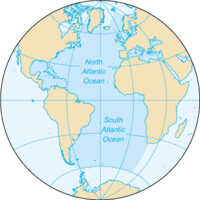
Photo from wikipedia
Climate change has been implicated in an increased number of distributional shifts of marine species during the last century. Nonetheless, it is unclear whether earlier climatic fluctuations had similar impacts.… Click to show full abstract
Climate change has been implicated in an increased number of distributional shifts of marine species during the last century. Nonetheless, it is unclear whether earlier climatic fluctuations had similar impacts. We use ancient DNA to investigate the long-term spawning distribution of the Northeast Arctic cod (skrei) which performs yearly migrations from the Barents Sea towards spawning grounds along the Norwegian coast. The distribution of these spawning grounds has shifted northwards during the last century, which is thought to be associated with food availability and warming temperatures. We genetically identify skrei specimens from Ruskeneset in west Norway, an archaeological site located south of their current spawning range. Remarkably, 14C analyses date these specimens to the late Holocene, when temperatures were warmer than present-day conditions. Our results either suggest that temperature is not the only driver influencing the spawning distribution of Atlantic cod, or could be indicative of uncertainty in palaeoclimate reconstructions in this region. Regardless, our findings highlight the utility of aDNA to reconstruct the historical distribution of economically important fish populations and reveal the complexity of long-term ecological interactions in the marine environment.
Journal Title: Biology Letters
Year Published: 2022
Link to full text (if available)
Share on Social Media: Sign Up to like & get
recommendations!